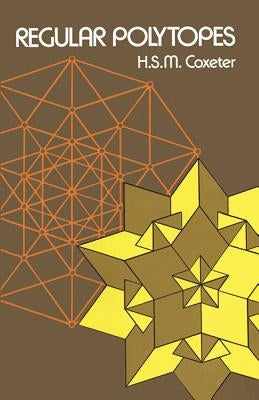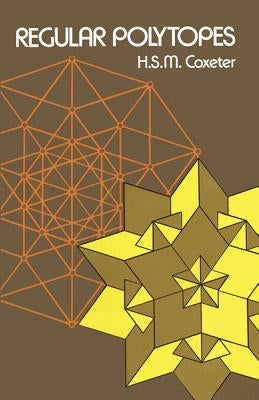Dover Publications
Regular Polytopes
Regular Polytopes
Couldn't load pickup availability
Professor Coxeter begins with the fundamental concepts of plane and solid geometry and then moves on to multi-dimensionality. Among the many subjects covered are Euler's formula, rotation groups, star-polyhedra, truncation, forms, vectors, coordinates, kaleidoscopes, Petrie polygons, sections and projections, and star-polytopes. Each chapter ends with a historical summary showing when and how the information contained therein was discovered. Numerous figures and examples and the author's lucid explanations also help to make the text readily comprehensible. Although the study of polytopes does have some practical applications to mineralogy, architecture, linear programming, and other areas, most people enjoy contemplating these figures simply because their symmetrical shapes have an aesthetic appeal. But whatever the reasons, anyone with an elementary knowledge of geometry and trigonometry will find this one of the best source books available on this fascinating study.
Author: H. S. M. Coxeter, Coxeter, Mathematics
Publisher: Dover Publications
Published: 06/01/1973
Pages: 368
Binding Type: Paperback
Weight: 0.85lbs
Size: 8.47h x 5.41w x 0.68d
ISBN: 9780486614809
About the Author
H. S. M. Coxeter: Through the Looking Glass
Harold Scott MacDonald Coxeter (1907-2003) is one of the greatest geometers of the last century, or of any century, for that matter. Coxeter was associated with the University of Toronto for sixty years, the author of twelve books regarded as classics in their field, a student of Hermann Weyl in the 1930s, and a colleague of the intriguing Dutch artist and printmaker Maurits Escher in the 1950s.
In the Author's Own Words:
"I'm a Platonist -- a follower of Plato -- who believes that one didn't invent these sorts of things, that one discovers them. In a sense, all these mathematical facts are right there waiting to be discovered."
"In our times, geometers are still exploring those new Wonderlands, partly for the sake of their applications to cosmology and other branches of science, but much more for the sheer joy of passing through the looking glass into a land where the familiar lines, planes, triangles, circles, and spheres are seen to behave in strange but precisely determined ways."
"Geometry is perhaps the most elementary of the sciences that enable man, by purely intellectual processes, to make predictions (based on observation) about the physical world. The power of geometry, in the sense of accuracy and utility of these deductions, is impressive, and has been a powerful motivation for the study of logic in geometry."
"Let us revisit Euclid. Let us discover for ourselves a few of the newer results. Perhaps we may be able to recapture some of the wonder and awe that our first contact with geometry aroused." -- H. S. M. Coxeter
This title is not returnable
Share


